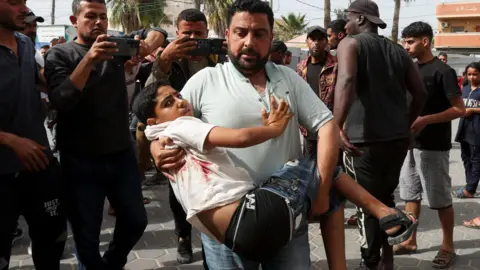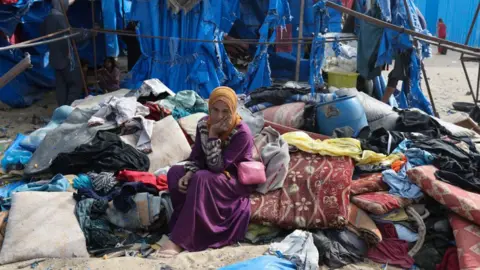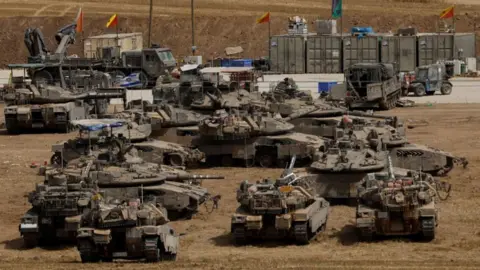Hamas proposes releasing some hostages in fresh talks after new Israel offensive
 Reuters
ReutersHamas has proposed releasing more hostages under a new Gaza ceasefire deal, after new negotiations were held on Saturday. The talks began hours after Israel's military launched a major new offensive in the Gaza Strip.
Hamas has agreed to release nine hostages in exchange for a 60-day truce and Israel releasing Palestinian prisoners, a Palestinian official told the BBC.
The official said the new proposed deal would also allow the entry of 400 aid trucks a day, and the evacuation of medical patients from Gaza. Israel, in turn, has demanded proof of life and detailed information about all remaining hostages.
The new round of ceasefire talks is being held through Qatari and US mediators in Doha, and began on Saturday afternoon local time.
Israel is yet to respond publicly to the proposed deal, but said prior to the talks that it would not withdraw troops from Gaza or commit to an end to the war.
The proposal would not include these elements, the BBC understands.
Israel's military announced the launch of a new offensive named "Operation Gideon's Chariots" earlier on Saturday, amid the deadliest wave of strikes in Gaza in months.
At least 300 people have been killed since Thursday, rescuers say, including at hospitals and refugee camps in the north and south of the Strip.
Thousands have died since Israel resumed strikes on 18 March, following the collapse of a fragile ceasefire which lasted two months.
Aid agencies say Gaza's grievous humanitarian situation has also worsened, as Israel has been blocking supplies of food and other aid from entering the territory for 10 weeks.
Israel's Prime Minister Benjamin Netanyahu earlier this month promised a major military escalation in the war to occupy and control swathes of Gaza, force the Palestinian population to the south of the territory, and "destroy" Hamas.
Speaking from inside Gaza, journalist Ghada Al Qurd told the BBC's Newshour programme there had been lots of "airstrikes, shellings, drones, shooting and even exploding, in the north and east."
"It's terrifying and horrible," she said.
She said her family had only been having one meal a day, due to the scarcity and spiralling cost, and accused Israel of "using food as a weapon" - an allegation UN officials have also made in recent weeks.
Aid agencies have warned about the risk of famine among Gaza's 2.1 million population, as footage and accounts emerge of emaciated children suffering malnutrition under the Israeli blockade.
US President Donald Trump said on Friday that "a lot of people were starving" in Gaza. The Israeli government has repeatedly rejected claims there is a food shortage in Gaza.
- Jeremy Bowen: Netanyahu's plan risks dividing Israel, killing Palestinians and horrifying world
- 'My children go to sleep hungry,' Gazans tell the BBC
Victoria Rose, a British reconstructive surgeon working at Nasser hospital in Khan Younis, told BBC Radio 4's Today programme that her team were "exhausted" and staff had lost a "considerable amount of weight".
"The children are really thin," she said. "We've got a lot of youngsters whose teeth have fallen out.
"A lot of them have quite significant burn injuries and with this level of malnutrition they're so much more prone to infection and they've got so much less capacity to heal."
 Reuters
ReutersIsrael's Prime Minister Benjamin Netanyahu had said on 5 May that Israel was preparing an "intense entry into Gaza" to capture and hold territory, but that it would not commence until Trump completed his tour of the Middle East. He left the region on Friday.
That day, residents across northern and central Gaza were told to leave their homes or places of shelter - an order aid workers say is almost impossible because many have already been repeatedly made homeless during the war.
The IDF said on Saturday it wouldn't stop operating "until Hamas is no longer a threat and all our hostages are home" and that it had "struck over 150 terror targets throughout the Gaza Strip" in the preceding 24 hours.
Strikes on Saturday hit towns in the north of Gaza, including Beit Lahiya and the Jabalia refugee camp, as well as in the southern city of Khan Younis, the Hamas-run health ministry and civil defence forces said.
 Anadolu/Getty Images
Anadolu/Getty ImagesThousands of Israeli troops, including soldiers and reservists, could enter Gaza as the operation ramps up in the coming days. Israeli tanks have also been seen at the border, Reuters news agency reported.
The intensified offensive has been condemned by the UN and some European leaders.
Commissioner-General of the UN's Palestinian refugee agency (Unrwa) Philippe Lazzarini expressed shock at Israel's military operation, saying: "How many more Palestinian lives will be wiped off from their homeland by bombardments, hunger or lack of medical care?"
"Atrocities are becoming a new norm, under our watch, making the unbearable bearable with indifference," he said.
Following the new strikes, the UN Secretary-General António Guterres, Spanish Prime Minister Pedro Sanchez, and Italy's Foreign Minister Antonio Tajani all called for a permanent ceasefire, while Germany's Foreign Ministry said the new offensive risked "worsening the catastrophic humanitarian situation for Gaza's population and the remaining hostages".
 Reuters
ReutersIsrael launched a military campaign to destroy Hamas in response to the group's cross-border attack on 7 October 2023, in which about 1,200 people were killed and 251 others were taken hostage. Hamas still holds 58 hostages.
At least 53,000 people have been killed in Gaza since then, according to the territory's Hamas-run health ministry, including more than 3,000 people since March.
